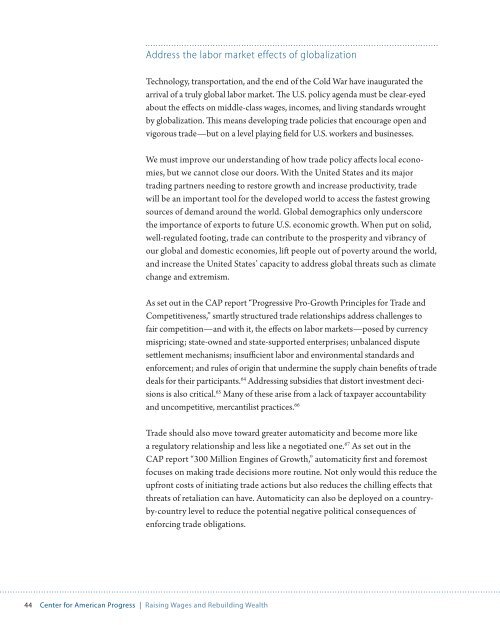AGENCY/PHOTOGRAPHER
RaisingWagesRebuildingWealth
RaisingWagesRebuildingWealth
Create successful ePaper yourself
Turn your PDF publications into a flip-book with our unique Google optimized e-Paper software.
Address the labor market effects of globalization<br />
Technology, transportation, and the end of the Cold War have inaugurated the<br />
arrival of a truly global labor market. The U.S. policy agenda must be clear-eyed<br />
about the effects on middle-class wages, incomes, and living standards wrought<br />
by globalization. This means developing trade policies that encourage open and<br />
vigorous trade—but on a level playing field for U.S. workers and businesses.<br />
We must improve our understanding of how trade policy affects local economies,<br />
but we cannot close our doors. With the United States and its major<br />
trading partners needing to restore growth and increase productivity, trade<br />
will be an important tool for the developed world to access the fastest growing<br />
sources of demand around the world. Global demographics only underscore<br />
the importance of exports to future U.S. economic growth. When put on solid,<br />
well-regulated footing, trade can contribute to the prosperity and vibrancy of<br />
our global and domestic economies, lift people out of poverty around the world,<br />
and increase the United States’ capacity to address global threats such as climate<br />
change and extremism.<br />
As set out in the CAP report “Progressive Pro-Growth Principles for Trade and<br />
Competitiveness,” smartly structured trade relationships address challenges to<br />
fair competition—and with it, the effects on labor markets—posed by currency<br />
mispricing; state-owned and state-supported enterprises; unbalanced dispute<br />
settlement mechanisms; insufficient labor and environmental standards and<br />
enforcement; and rules of origin that undermine the supply chain benefits of trade<br />
deals for their participants. 64 Addressing subsidies that distort investment decisions<br />
is also critical. 65 Many of these arise from a lack of taxpayer accountability<br />
and uncompetitive, mercantilist practices. 66<br />
Trade should also move toward greater automaticity and become more like<br />
a regulatory relationship and less like a negotiated one. 67 As set out in the<br />
CAP report “300 Million Engines of Growth,” automaticity first and foremost<br />
focuses on making trade decisions more routine. Not only would this reduce the<br />
upfront costs of initiating trade actions but also reduces the chilling effects that<br />
threats of retaliation can have. Automaticity can also be deployed on a countryby-country<br />
level to reduce the potential negative political consequences of<br />
enforcing trade obligations.<br />
44 Center for American Progress | Raising Wages and Rebuilding Wealth


